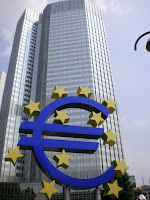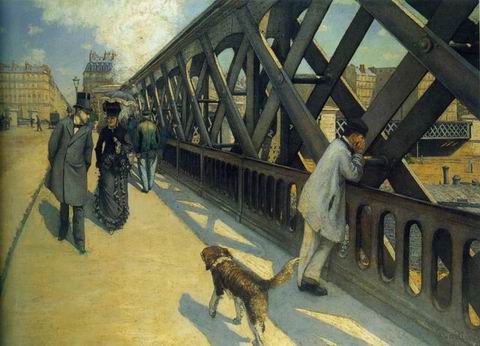I’ve been back in the US for a week now. I will now force you to read my reflections on my experience as a whole, after I rid my system of the urge to give you a step-by-step account of my last day. I may cry a little. Luckily, you won’t see it. I win.
Thursday, July 29, 7:45am. I woke up for the last time in my German apartment. I had made the place super-clean to appease the Superintendent, for whom “Cleanliness is very important.” There was nothing I could do about the rust that had appeared on the base of my hot plate, so I just left it. Cheap materials equal short lifespan. I had cleaned the floor with a hand broom and a makeshift mop made of damp paper towels and refuse clothing I did not wish to transport across an ocean. It was quite impeccable, at least by my standards. The Super at least said it was OK.
A friend met me to help me to the train station, since I was again carrying my livelihood in two suitcases and a backpack. The time came and I turned off my lights, shut my door and locked it for the last time. I think I left my window open.
Since the Super was on vacation that day, I threw my keys into his mailbox with a little note that said “hey, I’m gone.” And then I was. The bus was horrendous as always, but it was the last time, so I chose to spend the time waving goodbye to Würzburg as I passed everything. And then, before I knew it, I was on a train to Frankfurt, sitting across from a bicycle that took up two seats.
I got to the Airport and I had no idea where to go. I asked somebody and they said Terminal 2, so I hopped on the shuttle bus to said terminal, only to discover that it was the other one. I didn’t allow much time for major screw-ups, so I went into panic mode and became very impatient with the slow people leisurely loading their stuff. I eventually got to my terminal, ran like a madman around the women with children, checked in, and sat down at the gate. Everybody was speaking American English, so it started to feel like home again. I had to pee, but it would mean that I had to leave security (the security was right at the gate, how convenient), so I held it.
We finally boarded, found my seat and tried to relax. 9 hours on a plane to Chicago was not really what I wanted to do with my day, but it was necessary. The person next to me took up more than her fair share of space, so I got to squish myself against the window (at least I had that privilege.) The flight crew spoke with a variety of US-regional accents, which sort of made me happy. The flight attendant from Buffalo was my favorite.
The plane took off and the chorus began. Apparently Flight 83 from Frankfurt International to Chicago O’Hare had advertised a special: “Bring your screaming children across the ocean today, but only today.” Plenty of people had taken them up on their offer, so from the instant the captain said “prepare for takeoff,” the screeches and howls began. It was everything people have nightmares about. A brief moment of peace graced the passengers somewhere over Greenland, which, by the way, had no clouds and thus a beautiful view from my window. The glaciers, coastline, and ragged mountain ranges were picturesque.
We landed (much to my pleasure) and made it through customs. Since I was finally in my homeland, I (finally) got to go through the express customs/passport line, so I was in and out without stopping long enough to fall asleep. Since customs involved leaving security, I had the joy of going through it again. Angry Chicago people told me my carry-on bag was too big (even though it was clearly of size for my last flight) and I had to check it. I was too tired to fight back, so I paid my fee and trudged my way through security again. Since I had drawn the unlucky number and looked passive and maybe doped up, I was chosen to walk through the new full-body scanners, so some creep behind a curtain got to see me in my birthday suit. I feel violated and no more secure. Thank you, Patriot Act.
My first goal back on American Soil was to find a real cheeseburger and margarita. I had heard rumors that O’Hare had a Chilis restaurant, so I broke free from security, put my shoes back on, and traversed through the terminal. I reached the end and felt sad because I hadn’t seen my restaurant. A map told me that the place of my desire was in fact right next to security, but I was too anxious to flee that wretched area that I failed to notice. I sat down and ate. It was glorious.
My flight to DFW was late, so I might have fallen asleep standing up (thanks to American Airlines’s love of overbooking flights and not providing enough waiting room space at the gates) waiting to board. Once on board, I promptly entered unconsciousness with my neck awkwardly placed against that plastic wall. Before I knew it, we were at DFW. After a rather long wait to leave that port of entry, I fell asleep and awoke later that day in my homeland. I promptly drove a car, shopped at an outlet center, and drank a Dr. Pepper. After the initial culture shock of having somebody bag my groceries and shopping after 7pm, I began to fit in again.
So now I get to sit and ponder my experiences as a whole. I flew across the ocean expecting to see the Old World and feel all cultured and stuff. I left feeling not particularly better cultured, but at least left with a better understanding of how I fit into the world.
I discovered that Europe does not exist. Contrary to many of our conceptions that Europeans are high class, snobby, and the beacons of western civilization, I have come to terms with the fact that Europe is some rusty remnant of the old world. Choosing to view Europe as one common thread and studying it as such is a naive notion. Regional differences prevent the kind of cooperation we take for granted in the United States, and these regional differences stem back thousands of years. Within small geographic distances, people speak different languages and harbor deep-down grudges and jealousies that really don’t exist between regions in the US. Even through the disparity between Republicans and Democrats in the US Congress, at least that is split into two parts. Europe is split into at least 25 combinations of opinions. The EU is artificial, and it will take a few generations before Europeans will start to identify themselves as citizens of a united continent. The common culture of the arts and literature is in reality a chasm between Italy, Germany, France, and the East. The small countries insist on their sovereignty in the face of the super-powers trying to take them over via the European Parliament. Ideas of race and ethnic identity make Europe a mixture of explosives, not a melting pot. The warring tribes continue to fortify their walls from their neighbors, strengthening the tension.
My view for the future of Europe involves lots of time. Slowly the regions are blending and becoming peaceful, but it’s so slow that my generation will probably not reap the fruits of that tree. Maybe by the time my great-grandchildren’s grandchildren are of age, Europe will be one if the path continues, but I’m not even convinced that’s a path that should be taken.
So thank you for reading. I hope you’ve enjoyed it. I’m sure I’ll start up another blogging venture eventually. But until then, keep your mind open and active, do something new and exciting, and write about it.


















